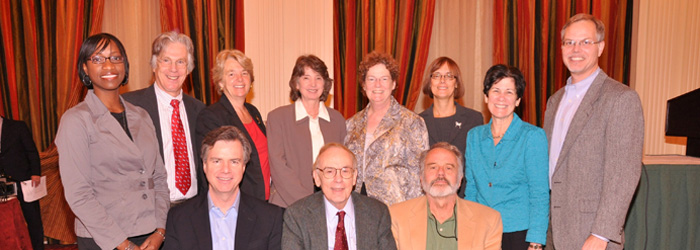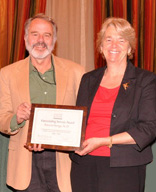2009 Cohort Consortium Annual Meeting
"Responding to New Challenges"
The NCI Cohort Consortium celebrated its 10th anniversary at its annual meeting held on November 5, 2009, in Bethesda, MD. The meeting was sponsored by the Division of Cancer Control and Population Sciences (DCCPS) and the Division of Cancer Epidemiology and Genetics (DCEG).

From left to right, standing: Chinonye Harvey, M.P.H., Epidemiology and Genomics Research Program (EGRP),
Division of Cancer Control and Population Sciences (DCCPS), NCI; Michael J. Thun, M.D., American Cancer Society;
Patricia Hartge, Sc.D., NCI Division of Cancer Epidemiology and Genetics (DCEG); Julie Palmer, Sc.D., Boston University;
Deborah Winn, Ph.D., DCCPS Deputy Director, NCI; Anne Zeleniuch-Jacquotte, M.D., New York University;
Julie Buring, Sc.D., Brigham and Women's Hospital and Harvard University; James Cerhan, M.D., Ph.D., Mayo Clinic;
From left to right, seated: Robert T. Croyle, Ph.D., DCCPS Division Director; Joseph F. Fraumeni, Jr., M.D., DCEG Division Director;
Robert N. Hoover, M.D., Sc.D., DCEG; Not Pictured Daniela Seminara, Ph.D., M.P.H., EGRP;
Scott Rogers, M.P.H., EGRP; and Geoff Tobias, DCEG.
The meeting participants reviewed the status of the Cohort Consortium’s signature projects – the Breast, Prostate, and Colorectal Cancer Consortium (BPC3); Pancreatic Cancer Cohort Consortium; Vitamin D Pooling Project (VDPP); and the Body Mass Index (BMI) and All-Cause Mortality Pooling Project – and brainstormed about future directions for the Consortium as a whole.
Outgoing Consortium Chair, Patricia Hartge, Sc.D., of DCEG, commended members on the overwhelming success of the signature projects and reviewed its key accomplishments over the past year, including the submission en bloc for publication of the results from the VDPP. These findings will clarify issues related to vitamin D and cancer.

Patricia Hartge, Sc.D., NCI Division
of Cancer Epidemiology and Genetics
(DCEG), was presented with NCI's
Outstanding Service Award
from Robert N. Hoover, M.D.,
Sc.D., DCEG.
During the meeting, Dr. Hartge received NCI’s Outstanding Service Award for her leadership which has been instrumental in building the Consortium over the past three years. The new Chair is Michael Thun, M.D., M.S., of the American Cancer Society (ACS).
Two new members were appointed to the Consortium’s Secretariat, Julie Buring, Sc.D., of Brigham and Women’s Hospital and Harvard Medical School, and Scott Rogers, M.P.H., of EGRP.
Stephen Chanock, M.D., of DCEG, chaired the first plenary session focused on incorporating genomic approaches in cohorts. Andrew Singleton, Ph.D., of the National Institute on Aging (NIA), gave a presentation on integrated analyses of quantitative trait loci in neurological disease, namely regions of the genome identified as risk variants through genome-wide association studies (GWAS). These risk variants subsequently were associated with transcriptional alterations and DNA methylation, enabling the identification of new therapeutic targets. Leslie Biesecker, M.D., of the National Human Genome Research Institute (NHGRI) spoke about the ClinSeq pilot project which aims to correlate genetic risk variants with disease phenotype in an ongoing, interactive researcher-patient relationship. EGRP grantee David Hunter, Sc.D., of Harvard University, discussed the lack of a genetic basis for highly heritable traits – the “dark matter” of the genome, and the possibility that gene-gene or gene-environment interactions and/or intronic regions of DNA might account for this “missing heritability” and be identified using GWAS conducted by groups such as the Consortium.
A second plenary session, moderated by EGRP’s Daniela Seminara, Ph.D., M.P.H., focused on biobanking, proteomics, and biomarkers in cohort studies. Pierre Hainaut, Ph.D., M.S., of the International Agency for Research on Cancer (IARC), contended that future “smart” cohorts will bridge the gap between population and clinical cohorts, employing biospecimens collected according to strict evidence-based protocols, and using characterized biomarkers to inform therapeutic interventions. Samir Hanash, M.D., Ph.D., of Fred Hutchinson Cancer Research Center, gave a presentation on the exciting potential of proteomics, the study of which has led to identification of promising risk factors and early detection markers through evaluation of the proteomes of individuals prior to diagnosis of disease.
EGRP grantee Susan Hankinson, Sc.D., of Harvard University, set the stage for the strategic planning workshop by articulating characteristics of projects suited to the Consortium:
- tackling questions that no single cohort can adequately answer, such as those related to proteomics, metabolomics, or rare cancers;
- conducting research that addresses pressing public health issues, such as the role of folate in cancer development and the importance of timing and dose-responses related to confirmed associations; and/or
- verifying preliminary results and confirming associations found in other studies, such as the possible correlation between lycopene and prostate cancer, and insulin-like growth factor and colorectal cancer.
The strategic planning workshop was chaired by EGRP grantee Julie Palmer, Sc.D., M.P.H., of Boston University and the Black Women’s Health Study. In addition, several Consortium research projects and working groups held ancillary meetings November 3 - 6, including the BPC3, VDPP, the Pancreatic Cancer Cohort Consortium, BMI and All Cause Mortality Pooling Project, and working groups focusing on brain, kidney, and small intestinal cancers and non-Hodgkin’s lymphoma.
View the 2009 annual meeting agenda.



